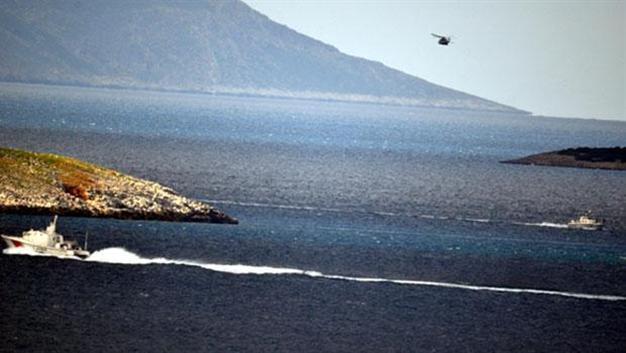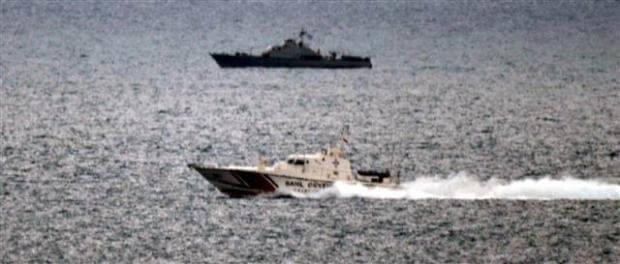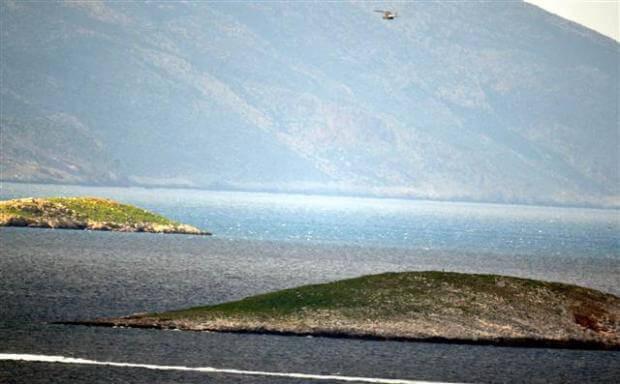Greek minister leaves wreath at Aegean hotspot, sparking confrontation with Turkey
BODRUM

DHA photos - Yaşar Anter
Greece’s new defense minister has started his term by reportedly leaving a wreath off the waters of the Aegean islets that led Ankara and Athens nearly to the point of war in the past.
Defense Minister Panos Kammenos went to the disputed Aegean islets of Imia/Kardak in a military helicopter on Jan. 30, according to Greek media. Meanwhile, seven Greek coastguard boats faced three Turkish ones off the islets, as Greek and Turkish fighter jets harassed each other.
The Doğan News Agency footage shows the moments of naval confrontation, which did not escalate after the Greek military helicopter left the area.
The islets, Imia in Greek and Kardak in Turkish, are a pair of two small uninhabited rocks in the Aegean Sea, situated between the Greek island chain of the Dodecanese and the southwestern mainland coast of Turkey. Greece and Turkey nearly went to war over the islets in early 1996 in an escalation that saw both sides embarking on a military landing on an islet for each.
Kammenos had announced on Jan. 29 that he would leave a wreath in the sea to commemorate the Greek military officers who died when their helicopter crashed on one of the islets 20 years ago.

Radical left-wing Syriza coalition won 36.3 percent of the vote in Jan. 25’s elections, catapulting its leader Alexis Tsipras to the post of prime minister. The right-wing Independent Greeks party, which gained 27.8 of the votes, had agreed to join Syriza in a coalition government.
Panos Kammenos, the head of Independent Greeks, was appointed defense minister. Although ideologically different from Syriza, the Independent Greeks share its anti-austerity policy.
Many left-wing Greeks had seemed sympathetic to the Turkish stance on the now-frozen Imia/Kardak conflict. However, a deputy from Syriza was accused of treason and removed from a parliamentary panel last year for suggesting that the Aegean islets belonged to Turkey. His party had announced then that Nasos Theodoridis’ statements only reflect his own opinion.
Tsipras to visit Greek Cyprus
Meanwhile, Prime Minister Tsipras is to travel to close ally Greek Cyprus on Feb. 1 for his first visit abroad since his election victory, Cypriot officials said.
On a brief visit to Greece’s fellow bailed-out EU member state, Tsipras is to meet with Greek Cypriot President Nicos Anastasiades and address parliament in Nicosia.
Government spokesman Nicos Christodoulides told reporters the visit was expected to “highlight the close cooperation that has long existed between Greece and Cyprus.”
“Tsipras is not expected to release a surprising statement about the Cyprus problem,” daily Hürriyet’s Athens correspondent Yorgo Kırbaki said.
Syriza swept to power by pledging to end painful austerity measures after six years of recession demanded by the EU and the International Monetary Fund in return for a multi-billion euro bailout.
Greek Cyprus is also a Eurozone member that needed rescue aid in March 2013 to save its banking system from collapse.
Unlike Greece, the conservative administration in Nicosia has taken a less confrontational approach with its international lenders and won praise for sticking to its task.
Tsipras and Anastasiades are expected to discuss the Eurozone, Ukraine crisis and efforts to solve Cyprus’s long-standing division.
Both Nicosia and Athens have been resistant to sanctioning Moscow over the conflict.
Cyprus has been divided since 1974 when Turkish troops invaded the northern third of the east Mediterranean island in response to an Athens-engineered coup aimed at uniting it with Greece.


